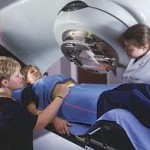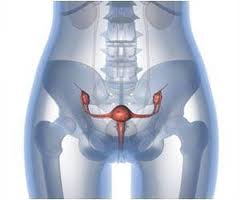Endometrial cancer is a kind of cancer that starts in the uterus. Uterus is the pelvic organ in women which has a pear-shaped and the place where the fetal development takes place. Endometrial cancer normally starts in the layer of the cells forming the lining of the uterus or also known as endometrium. Endometrial cancer is also called uterine cancer. There are other types of cancer that can develop in the uterus but the most common type is the endometrial cancer.
Endometrial cancer usually discovers at an early stage since it produces unusual vaginal bleeding which alarmed women to consult their doctor. Removing the uterus surgically is usually the recommendation of the doctor upon discovering it in an early stage to eradicate all of the cancer cells.
What are the symptoms of endometrial cancer?
The signs and symptoms of endometrial cancer may include the following.
- Vaginal bleeding after menopausal stage
- Extended or prolonged bleeding between periods
- Unusual, wet or blood-tinged discharge from vagina
- Pain during sexual intercourse
- Pelvic pain
What are the causes of endometrial cancer?
Unfortunately, the real cause of endometrial cancer is not yet known. What the medical expert known is that there is a genetic mutation that takes place in the endometrium cells. This genetic mutation makes the normal and healthy cells into an irregular cell. The normal and healthy cells develop and increase in number until finally dies. Unlike, with the abnormal cells that develops and increases uncontrollably forming a mass. This can lead to cancer cells that may also attack the close by tissues and can also extend to other parts of the body.
What are the risk factors that may affect endometrial cancer?
The following are the factors that may enhance the risk of developing endometrial cancer.
- Hormonal imbalance of female hormones may normally cause changes in the endometrium. The ovaries of the women produce two major female hormones, the estrogen and the progesterone. An illness or condition that raises the estrogen level but not the progesterone level may enhance the risk of endometrial cancer. Examples of disorder or conditions that can cause hormonal imbalances are polycystic ovary syndrome, diabetes and even obesity. Intake of hormonal pills after menopause that contain estrogen may also enhance the risk of endometrial cancer.
- Beginning of menstruation before the age of 12 or starting of menopause at later age may also enhances the risk of developing endometrial cancer. The longer of menstruation period the woman has the greater contact of endometrium to estrogen hormone.
- Women who never been experience of being pregnant have a higher possibility of endometrial cancer than to those women who have had at least one pregnancy.
- Older women who have experience menopause have a greater risk of having endometrial cancer. Most of the endometrial cancer patients are older women.
- Women affected with breast cancer and taking the hormone therapy drug, tamoxifen have greater possibility of having endometrial cancer.
- If colon cancer syndrome runs in the family, there is the greater risk of having colon cancer and even endometrial cancer.
What are the treatments for endometrial cancer?
1.    Surgical procedure
 Removal of the uterus is the most recommended for women with endometrial cancer through surgical procedure called hysterectomy. Sad to say, hysterectomy may result of incapability of having children in the future. There are cases that ovaries and fallopian tubes are needed to be removed and this procedure is called salpingo-oophorectomy. Removal of ovaries may lead to menopause, if in case does not have yet already.
Removal of the uterus is the most recommended for women with endometrial cancer through surgical procedure called hysterectomy. Sad to say, hysterectomy may result of incapability of having children in the future. There are cases that ovaries and fallopian tubes are needed to be removed and this procedure is called salpingo-oophorectomy. Removal of ovaries may lead to menopause, if in case does not have yet already.
2.    Radiation  therapy
 Radiation therapy makes use of powerful energy beams like X-rays to destroy cancer cells. There are some instances that the doctor may advise radiation to lessen the risk of recurrence of the cancer after surgery. Radiation therapy may also be an option for women with endometrial cancer that are not healthy enough for surgery. Radiation therapy has two types, the external beam radiation wherein the patient will lie on the table facing a machine that directs radiation to the exact affected part of the body. The other one is the internal radiation or also called brachytherapy wherein it involves an insertion of a small radiation-filled device inside the vagina for a short period of time.
Radiation therapy makes use of powerful energy beams like X-rays to destroy cancer cells. There are some instances that the doctor may advise radiation to lessen the risk of recurrence of the cancer after surgery. Radiation therapy may also be an option for women with endometrial cancer that are not healthy enough for surgery. Radiation therapy has two types, the external beam radiation wherein the patient will lie on the table facing a machine that directs radiation to the exact affected part of the body. The other one is the internal radiation or also called brachytherapy wherein it involves an insertion of a small radiation-filled device inside the vagina for a short period of time.
 3.    Hormonal therapy
 Hormonal therapy is the intake of medications that may have an effect on the hormonal levels inside the body. Hormonal therapy may be the choice if the endometrial cancer has already spread and affects other part aside from uterus. There are two options of medication; the first one is the medications that enhance the progesterone level in the body that may help to end the endometrial cancer cells from growing. The other one is the medications that may help to lessen the estrogen level inside the body so the endometrial cancer cells may expire in reaction to these medications.
Hormonal therapy is the intake of medications that may have an effect on the hormonal levels inside the body. Hormonal therapy may be the choice if the endometrial cancer has already spread and affects other part aside from uterus. There are two options of medication; the first one is the medications that enhance the progesterone level in the body that may help to end the endometrial cancer cells from growing. The other one is the medications that may help to lessen the estrogen level inside the body so the endometrial cancer cells may expire in reaction to these medications.
 4.    Chemotherapy
 Chemotherapy is the type of therapy that makes use of chemicals to destroy cancer cells. Chemotherapy medication may be taken as orally by pill or as intravenously. Chemotherapy may be the choice for women affected with advanced endometrial cancer that has already reached other parts further than the uterus.
Chemotherapy is the type of therapy that makes use of chemicals to destroy cancer cells. Chemotherapy medication may be taken as orally by pill or as intravenously. Chemotherapy may be the choice for women affected with advanced endometrial cancer that has already reached other parts further than the uterus.
For those women who have experienced the mentioned signs and symptoms of endometrial cancer, immediately consult with your doctor to have an early proper evaluation and treatment.
